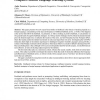Free Online Productivity Tools
i2Speak
i2Symbol
i2OCR
iTex2Img
iWeb2Print
iWeb2Shot
i2Type
iPdf2Split
iPdf2Merge
i2Bopomofo
i2Arabic
i2Style
i2Image
i2PDF
iLatex2Rtf
Sci2ools
AIEDU
2007
2007
A Study of Feedback Strategies in Foreign Language Classrooms and Tutorials with Implications for Intelligent Computer-Assisted
This paper presents two new corpus-based studies of feedback in the domain of teaching Spanish as a foreign language, concentrating on the type and frequency of different feedback moves, as well as what happens in the moves that follow the feedback. In particular, as well as looking at positive feedback, it concentrates on two general kinds of negative feedback strategies: (1) Giving-Answer Strategies (GAS), where the teacher directly gives the desired target form or indicates the location of the error, and (2) Prompting-Answer Strategies (PAS), where the teacher pushes the student less directly to notice and repair their own error. Investigating the GAS/PAS distinction sheds light on the relative importance for Intelligent Computer-Assisted Language Learning (ICALL) systems of knowledge construction from interaction, which many believe is crucial for effective learning from ITS. The main finding here is that, although GAS occur more frequently than PAS in both corpora, it is the PAS ...
| Added | 08 Dec 2010 |
| Updated | 08 Dec 2010 |
| Type | Journal |
| Year | 2007 |
| Where | AIEDU |
| Authors | Anita Ferreira, Johanna D. Moore, Chris Mellish |
Comments (0)

